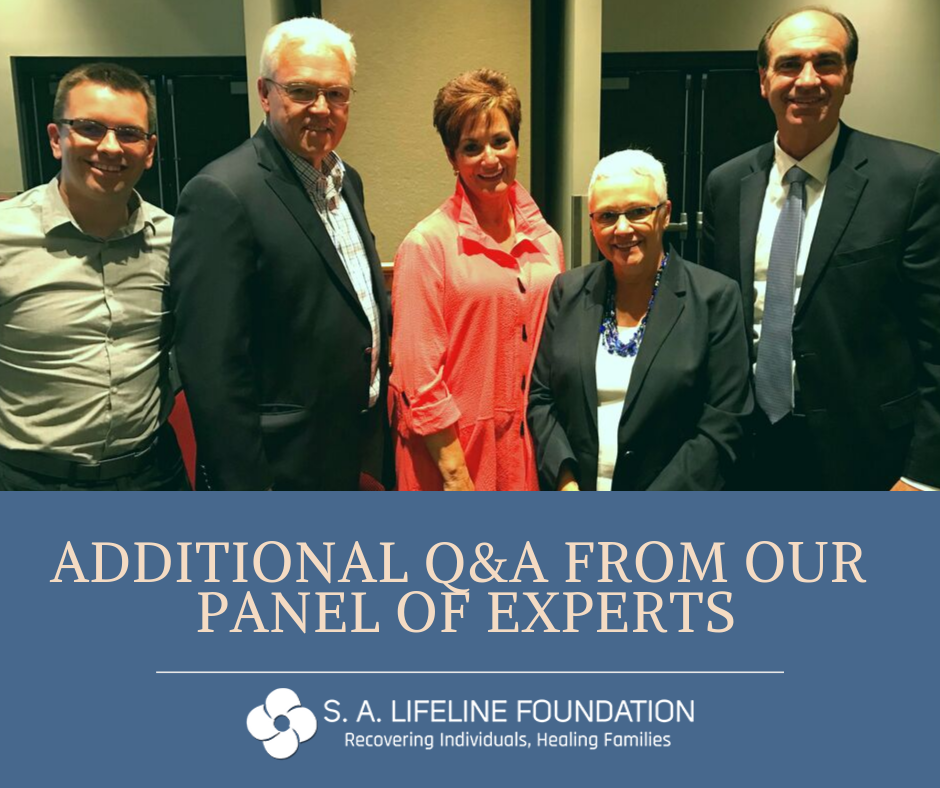 If you were able to attend or purchase the 2019 S.A. Lifeline Conference on September 21st, 2019, you will remember our excellent Q&A panel. With the help of our efficient moderator, we were able to get through an unprecedented number of questions with our excellent panel. However, several questions were left unanswered. We want to do all we can to make sure all submitted questions are answered.
If you were able to attend or purchase the 2019 S.A. Lifeline Conference on September 21st, 2019, you will remember our excellent Q&A panel. With the help of our efficient moderator, we were able to get through an unprecedented number of questions with our excellent panel. However, several questions were left unanswered. We want to do all we can to make sure all submitted questions are answered.
Steven & Rhyll C. have graciously agreed to answer some additional questions. We are hopeful that the other panel members will also contribute additional answers and we will keep you posted when we receive them.
And good news–you don’t have to wait until next year’s Conference if you have a question you would like to see addressed! Simply email becky@salifeline.org and enter “Q&A” as the subject of your message, and we will do our best to answer your question anonymously on our Discussion Boards.
Question:
What is your advice for a woman who sees all the outward symptoms of addiction in her husband but no actual evidence? (All 6 children have sex addiction type behaviors. Over 25 years of marriage. Husband refuses counseling. He is mean.)
Answer:
Sexual addiction does not show the usual signs of addiction. There is no smell, no marks or anything physical . In fact I have never seen any proof that my husband has ever acted out sexually. He was able to hide it so well.
So my experience is that if there are addict behaviors (like those listed in the addict circles models), there is a very good chance that there is sexual acting out behavior going on. However, I do not have to have any proof to understand when I don’t feel safe in a relationship. I don’t have to find proof to decide that it is important for me to actively work on my own recovery. My experience is that I must start to work to recover my confidence, peace, serenity and direction in life.
The tools of recovery will help every one of us to gain a greater connection with God and to learn to trust our instincts that are God given.
Become educated, join an SAL 12-step group and work the steps with a sponsor, learn to set and hold healthy boundaries and find qualified therapy. Those steps lead to a more peaceful and fulfilling life.
May you be blessed and guided as you seek for greater serenity.
Love,
Rhyll
Question:
What are the keys to an effective check-in?
Answer:
Keys to an effective check-in include:
- Honesty, transparency and accountability.
- Check-in is not a dumping ground for triggers that have not been properly surrendered.
- Respecting the opportunity of your spouse to check in without interruption.
- Respecting the thoughts and feelings shared during the check-in.
- Consistency…every day or evening
Note: Expressing anger or resentment after check-in about your spouse’s comments during check-in will kill the future effectiveness of checking in. It is important to build trust so that feelings can be safely shared.
See the “Vowel Check In” as explained in the book What Can I Do About Me? By Rhyll Croshaw p. 85-86
-Steven C.







I have been in NA 32 years
Have Got to Plug into a mens Group
Been obstinate from acting out for a month now
Need to get Plugged in & Find A sponser